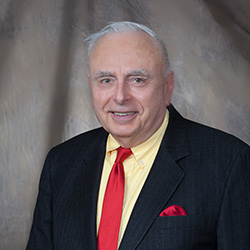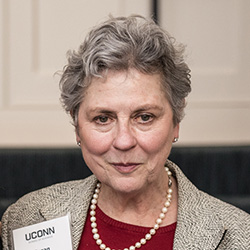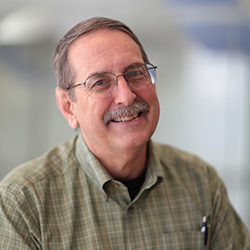School of Business Wishes a Happy Future to Professors Carrafiello, Spiggle and Ross
Kayaking in South Carolina, reading, gardening and tackling new research projects are on the retirement ‘to-do’ lists of three prominent Marketing Department professors.
This year’s three School of Business retirees all hail from the Marketing Department, and include:
- Professor Vin Carrafiello taught business law for 52 years, the majority of the time at UConn’s Stamford campus, before retiring April 1. Carrafiello is known for his sharp wit and longstanding preference for traditional forms of communication over electronic technology.
- Professor Susan Spiggle has taught at the School of Business since 1982, but retirement won’t slow down her research efforts in the slightest, she said. Spiggle will be back on campus in the fall, coaching Ph.D. students to improve their writing skills.
- Professor William Ross, a seven-year faculty member, Voya Financial Chair and Marketing Ph.D. Coordinator, said the opportunity to nurture the careers of Ph.D. students while working with outstanding colleagues highlighted his UConn career.
Marketing Department Head Robin Coulter said she is going to miss the three, both personally and professionally and said their contributions to their students have been immense.
“The department, school and university will miss their passion and engagement to create and impact knowledge,” she said. “Their shoes will be difficult to fill.”
Carrafiello Considers Himself a Lucky Man
Carrafiello earned both his master’s degree and his law degree from UConn before embarking on his teaching career 52 years ago.
“I passed my state bar exam in August 1965, and started teaching at UConn in September,” he said. “If you told me then that I’d be spending the rest of my professional life at the University of Connecticut, I would have told you that you were crazy, and certifiably so! But sometimes the best things in life are unplanned, unexpected and full of surprise.”
Known for his quick wit, Carrafiello also quipped:
“I want to pay tribute to all the students, undergraduate and graduate level, whom I’ve taught over the years. I’m not sure how they were able to stand me in class with my long-winded lectures,” he joked.

Among the many changes that Carrafiello witnessed was the creation of the current campus in Stamford, where he taught for many years. While he embraced that change, he was known for his preference for “traditional” communication. He faithfully avoided technology—never even adopting email.
After officially retiring on April 1, Carrafiello said he is transitioning into retirement. Carrafiello, who beat cancer four times and survived open-heart surgery, said he is a lucky man.
“Now I plan to rest and do a lot of reading,” he said.
Spiggle Retiring, but Not Slowing Down
Spiggle has worked at the School of Business since 1982, based in Storrs, but also teaching in Hartford. She has also been involved in the University Senate and other university-wide committees and said she will miss the connections she has made with respected and admired colleagues from across the community.
Spiggle earned a master’s degree, Ph.D. and MBA all from UConn. She served as department head for both marketing and management, and her 1994 Journal of Consumer Research article on analysis and interpretation of qualitative data, with some 2,000 Google citations, is a vital reference for marketing faculty.

When asked about her favorite memory of UConn, she said it would be the many exceptional teaching moments.
“It is a composite memory, not a single instance, of observing students displaying a real understanding of course material: a question that they asked, or answer they provided in class discussion, or even an answer on an exam,” she said. “It suggests a spark of insight or understanding that permits them to apply, abstract, and create knowledge.”
One of the biggest changes she has witnessed while at UConn is a surge in quality in almost everything, she said, from students to faculty, research to administration and institutional policies.
Spiggle has planned a busy retirement. She said she has two research projects underway. The first examines how brands become icons, and the second explores the dynamics of the art market. She is looking forward to research collaborations with new faculty in the marketing department.
“I will certainly miss teaching after some time,” she said. “But I won’t miss spending 12-hour ‘grading marathons,’ especially on beautiful weekends.”
In the fall, she will return to campus as a writing specialist, coaching Ph.D. students. Already a frequent traveler, she is looking forward to devoting more time to her gardens.
Ross Plans a Year of Kayaking, Southern Fun
Just days after teaching his last Executive MBA class, Ross said he had mixed feelings about the next chapter in his life.
“I’m excited to retire but it’s really kind of sad as well,” said Ross, who is the Voya Chair at UConn and the Marketing Ph.D. coordinator.
Prior to joining the UConn faculty, Ross had worked at Penn State for 10 years and also at Temple University and the Wharton School at the University of Pennsylvania for seven years each. Coulter referred to him as a marketing-strategy scholar, but added that his scholarship spans the discipline.

At UConn, Ross said, he found colleagues who are always willing to go out of their way to lend a hand.
“They are great scholars and we’ve brought in excellent junior faculty to continue that tradition,” he said. “I also really like our Dean (John Elliott). He’s very personable, thoughtful and considerate and he works for what is the best for the institution,” Ross said. “In my career, I’ve worked with two fabulous deans and one good dean, and he’s one of the fabulous ones!”
As the Ph.D. coordinator for Marketing, Ross said he enjoyed spending time with young scholars. He anticipates immersing himself in research for at least another five years, working closely with his former students-turned-professional colleagues.
Living in Connecticut was a long-time dream, said Ross, who is an avid history buff and marvels at Connecticut’s rich past, including 1700-era farmhouses and historic villages.
His immediate plan is to spend a year at his second home in South Carolina, with his wife and mother-in-law. He plans to kayak, explore the local history and just plain have fun. “I plan to spend the next year with no long-term commitments,” he said. “After that, I may resume some teaching and some research projects.”




